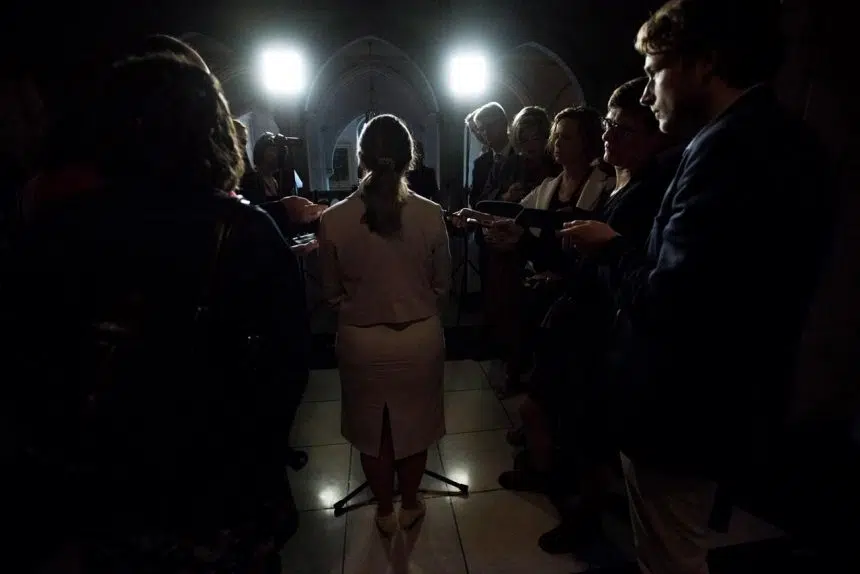WASHINGTON — Thirteen months is an “absolutely normal” time frame for a task as complex as modernizing North American trade, Foreign Affairs Minister Chrystia Freeland said Wednesday as she notched another day on the road towards a new NAFTA deal with the United States and Mexico.
On a day where signs of progress were in the air, Freeland shrugged off talk of congressional deadlines and growing impatience in political circles as she justified the amount of time it has taken for all three sides to get to their current positions.
Rome, in other words, wasn’t built in a day.
“For an agreement of this scale, 13 months for a very deep modernization of the kind we’re working on is absolutely normal,” said Freeland, who will be back for more talks Thursday. “Trade agreements do take some time, both to negotiate and to update, because the economy is complicated and trade agreements are complicated.”
And when asked whether she could hear the clock ticking, she said: “Canada’s sole objective — the only target that we are aiming for — is getting a good deal for Canada, so that’s what we’re focused on.”
Among the evidence that the finish line isn’t far away: word from sources familiar with the negotiations that the U.S. backed off in recent weeks on its demands for lucrative procurement projects.
Then there was the mood of Freeland herself, who arrived in the U.S. capital the night before wearing a T-shirt from her kids emblazoned with the slogan, “Keep Calm and Negotiate NAFTA,” and thanked journalists for keeping vigil and ordinary Canadians for their expressions of support.
“People come up to me on the street or in airports, which is where I am often found, just saying how strongly they support Canada in these complex negotiations,” she said before a midday meeting with Ontario Premier Doug Ford, in town to wave the Team Canada flag.
“I just want to say to everyone who has done that, thank you very much. It means a lot to me. I always share your messages with the negotiating team, and that gives us real strength and reminds us of how important the work we’re doing is for Canadians.”
She credited Mexico with making significant concessions in its deal with the U.S. on automobiles and for permitting large wage increases for Mexican auto workers — something Canada and the U.S. both wanted to stop the growing flow of automobile production into Mexico because of its cheap labour.
“Over the summer, Mexico made some very deep, very difficult concessions on rules of origin,” she said, referring to an early U.S. demand that would have dramatically increased the amount of American content required in cars built outside the country.
“The fact that Mexico made those concessions is good for higher-wage workers; good for the high-wage workers of Canada, good for the high-wage workers of the U.S., and that is what allowed the rest of the negotiations to move forward.”
And there was the all-nighter pulled by one of Canada’s negotiating teams, which Freeland said didn’t wrap up its marathon session until 7 a.m. Wednesday morning. “There is some very intensive work happening,” she acknowledged as she thanked negotiators, too, for their tireless efforts.
Sources say Mexico believes it has also done much of the “heavy lifting” on getting the Americans to back down on its demand to limit the ability of Canadian and Mexican firms to bid on U.S. infrastructure projects, while seeking greater access for American firms to Mexican and Canadian government projects.
Mexico and Canada are both quietly taking credit for standing firm against the controversial U.S. position that would have effectively limited their respective countries’ ability to bid on valuable American government infrastructure projects.
Earlier in the day in Ottawa, Prime Minister Justin Trudeau said Canada isn’t backing down from its own demands — a position that has some U.S. legislators bristling at what they consider a stalling tactic.
“We’ve been very clear that we’re interested in what could be a good deal for Canada, but we’re going to need to see a certain amount of movement in order to get there,” Trudeau said.
Pressure is mounting on the federal government to get a deal done. On Wednesday, Texas Republican Kevin Brady, head of the influential House Ways and Means committee, told CNBC the two sides are “close enough” and the time has come for Canada to “step it up” and get on board.
Trade observers say that while many in Congress want Canada to be part of a three-way deal, they may not be willing to sacrifice an agreement in principle between Mexico and the U.S. negotiated earlier this year.
That deal is widely seen to require congressional approval before Dec. 1 in order to survive the arrival of an incoming Mexican government whose supporters have mixed feelings about the agreement.
Jerry Dias, head of Unifor, Canada’s largest private-sector union, said Canadian negotiators remain unmoved by the recent rumblings on Capitol Hill and focused on getting a deal that’s in the country’s best economic interests.
While Canada has been pushing for wording in NAFTA aimed at strengthening labour protections and gender equality, the overall negotiations are said to have stalled over Canada’s insistence that an agreement contain an independent dispute-settlement mechanism.
“There’s not going to be an agreement where disputes are handled in the American courts. Why would we do that?” Dias said.
“Having Colonel Sanders take care of the chickens — in other words, having all disputes handled in the U.S. courts — just doesn’t make any sense for Canadians.”
— With files from Mike Blanchfield in Ottawa
— Follow @CdnPressStyle on Twitter
James McCarten, The Canadian Press







